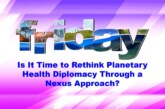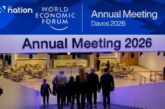
Dr. Arvind Kumar*

The UN 2023 Water Conference was convened from 22-24th March2023 in New York on the theme of water was after 44 years since 1977 and opened with energy and optimism for a true watershed moment and began with a clear diagnosis of the situation that progress has fallen severely short in achieving SDG 6 for universal access to WASH and actions that work, exist, but must be taken to scale. Some 10,000 participants gathered at UN Headquarters and online from 22 to 24 March 2023, to urgently scale up action to address the water crisis and ensure equitable access to water for all. Co-hosted by the Kingdom of the Netherlands and the Republic of Tajikistan, the Conference brought together world leaders, civil society, business leaders, young people, scientists, academics, the UN System and others from across sectors — agriculture, energy, environment and water — around a common goal: to urgently tackle the water crisis and set the world back on track to achieving SDG 6 – On Clean Water and Sanitation.
Why was this conference crucial?

Today half of the world population, four billion people, lives with severe water scarcity for at least one month of the year. About half a billion face water scarcity year-round. Approximately 4.2 billion people lack sanitation, 2.2 billion people lack safe drinking water, and 700 million people could be displaced due to scarcity of water by 2030. According to the World Meteorological Organization, the number of weather related disasters – floods, droughts, storms and extreme temperatures – has increased by a factor of five over the past 50 years, claiming, on average, the lives of 115 people and causing $202 million in economic losses daily. Enhanced water management can be catalytic in leaving no one behind, in communities fighting poverty and hunger, safeguarding health and reducing child mortality, and protecting natural resources. We need to get the incentives right, both in terms of financial instruments, political will and behavioural change at a scale we haven’t seen before – on both the supply and demand side.

Against this background, conference deliberations ranged from the urgency of the water crisis, including its role in forced migration, climate change and conflicts to stressing its critical link to good health, poverty reduction and food security. Attention was also given to solutions, with deliberations spanning the need for better data collection, enhanced governance systems, capacity development opportunities and funding gaps in the water sector.

With financing needs at between US$182 to more than US$600 billion annually, the importance of unlocking financing and innovative funding schemes, calling for new innovations and investments at scale in the water economy was also underscored.
Transformative Action Agenda
The Water Action Agenda, the key outcome of the Conference, captured over 700 commitments aimed at driving transformation from a global water crisis to a water-secure world. The agenda represents the global community’s bold resolve to address the water challenges through a more coordinated and results-driven approach (see select list of commitments below). A number of other follow-up steps are also under consideration – including the appointment of a Special Envoy on Water.
There were a number of commitments made at the conference viz.-
Member States
- The US announced a commitment of up to $49 billion in investments to support climate resilient water and sanitation infrastructure and services.
- Japan will proactively contribute to the solution of water-related social issues faced by the Asia-Pacific region by developing “quality Infrastructure”, providing financial assistance worth approximately 500 billion yen ($3.65 billion) over the next five years.
- Vietnam pledged to develop policies for major river basins management by 2025 and to ensure all households would have access to clean running water by 2030.
- Switzerland submitted 5 commitments to contribute to the UN’s work, including in the areas of the Water Convention and transboundary cooperation. Switzerland is the cochair of the Interactive Dialogue on Water for Cooperation.
- The Niger Basin Authority (NBA) and the German Federal Ministry for the Environment, Nature Conservation, Nuclear Safety and Consumer Protection (BMUV) made a joint commitment of $21.2 million in funding for a project that strengthens the Niger Basin Authority (NBA) and its member countries.
- The Government of Mozambique committed to taking all necessary steps to accelerate achievement of the UN Sustainable Development Goal (SDG) 6 by 2030 with investments of $9.5 billion.
- With the Continental Africa Investment Programme (AIP), the African Union Commission aims to close Africa’s water investments gap by mobilising at least US$30 billion/year by 2030 through a range of initiatives, including the International High-Level Panel on Water Investments for Africa.
- By 2030, the EU aims to support the access of 70 million individuals to an improved drinking water source and/or sanitation facility. The EU will also support Member States with €20 million funding to accelerate the deployment of wastewater surveillance for COVID-19.
- More than 50 leading global companies unite to make collective commitment to SDG 6.
Multilateral Banks
- The Asian Development Bank commits to investing $11 billion dollars in the water sector in the Asia-Pacific Region and $100 billion to the water sector globally by 2030.
Private Sector
- Starbucks, Ecolab, Gap Inc., Reckitt and DuPont joined forces with U.S. Government to invest nearly $140 million in Water Access Fund with the goal of reaching 5 million people with access to water, sanitation and hygiene.
- DANONE is launching a water acceleration blending fund to give daily safe water access to 30 million people in need.
- Xylem and 16 other companies commit $11 billion dollars in Research and Development.
- World Benchmarking Alliance has pledged to assess 1,000 global companies across 22 industries on their impact towards achieving water-related goals every two years to helps close the corporate accountability gap.
NGOs
- World Vision committed to raising and investing $2 billion by 2030 to extend the impact of transformative water, sanitation, and hygiene (WASH) services work across 50 countries in six regions
The road ahead

These benefits are welcomed in their place, but the conference is not centered on a series of small steps. Everyone is looking for big “game changer” commitments that will alter the trajectory of water governance and use. The key themes ranged across dialogues on Water for Health, Water for Sustainable Development, Water for Climate, Resilience and Environment, Water for Cooperation, Water Action Decade. As the subject of significant political momentum, a groundswell of support and commitment to accede to the UN Water Convention could be a key outcome of the Conference, with positive impacts for populations in shared basins worldwide.

With 153 states worldwide sharing rivers, lakes and groundwater reserves with their neighbours, yet only 24 having all their transboundary basins covered by operational arrangements, water cooperation is an increasingly critical issue, therefore the key themes ranged across dialogues on Water for peace, health (through access to clean water and sanitation), climate change adaptation, ecosystems, energy (hydroelectricity, nuclear power plant cooling), food production, disaster risk reduction; in short, for the entire sustainable development agenda. With so many countries depending on shared waters, increasing such cooperation is a precondition for transformative water action at the global level, which the Conference offered is a once-in-a-generation opportunity to deliver.
There have been events in the past as well but there is very little sign that these efforts have accelerated progress. Most countries remain off-track on targets for universal WASH. Most have made little progress on water security. And for those countries that have achieved transformational change, there’s no evidence that international commitments have been the trigger. If past summits have failed, what UN undertakings wouldspeed up progress on the SDG6? This is after all supposed to be the UN’s mid-term review of the international decade of action on water. That needs to be the operative word. I hope this Paris moment for water which emerged at this historic UN 2023 Water Conference shall sustain the momentum and the actions and commitments will be adhered on. More of the same will mean that we will have again wasted an opportunity for a new agenda on water. Billions of the most vulnerable can’t afford that. It’s not what happens in three days, it’s what happens afterward?
*Editor, Focus Global Reporter



